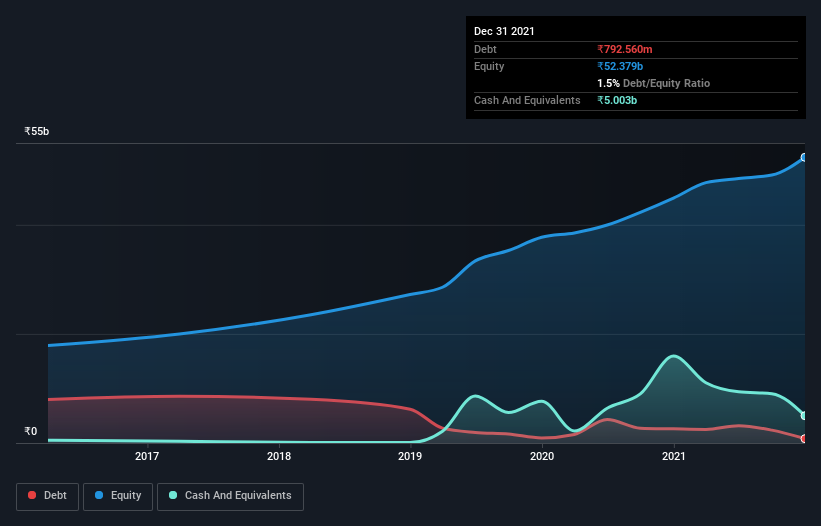
Warren Buffett famously said, 'Volatility is far from synonymous with risk.' So it might be obvious that you need to consider debt, when you think about how risky any given stock is, because too much debt can sink a company. We can see that Polycab India Limited (NSE:POLYCAB) does use debt in its business. But should shareholders be worried about its use of debt?
When Is Debt A Problem?
Debt assists a business until the business has trouble paying it off, either with new capital or with free cash flow. If things get really bad, the lenders can take control of the business. However, a more common (but still painful) scenario is that it has to raise new equity capital at a low price, thus permanently diluting shareholders. Of course, debt can be an important tool in businesses, particularly capital heavy businesses. The first step when considering a company's debt levels is to consider its cash and debt together.
View our latest analysis for Polycab India
How Much Debt Does Polycab India Carry?
As you can see below, Polycab India had ₹792.6m of debt at December 2021, down from ₹2.59b a year prior. However, its balance sheet shows it holds ₹5.00b in cash, so it actually has ₹4.21b net cash.

How Strong Is Polycab India's Balance Sheet?
The latest balance sheet data shows that Polycab India had liabilities of ₹18.3b due within a year, and liabilities of ₹1.16b falling due after that. On the other hand, it had cash of ₹5.00b and ₹12.4b worth of receivables due within a year. So its liabilities total ₹2.07b more than the combination of its cash and short-term receivables.
Having regard to Polycab India's size, it seems that its liquid assets are well balanced with its total liabilities. So while it's hard to imagine that the ₹401.9b company is struggling for cash, we still think it's worth monitoring its balance sheet. While it does have liabilities worth noting, Polycab India also has more cash than debt, so we're pretty confident it can manage its debt safely.
Another good sign is that Polycab India has been able to increase its EBIT by 21% in twelve months, making it easier to pay down debt. The balance sheet is clearly the area to focus on when you are analysing debt. But ultimately the future profitability of the business will decide if Polycab India can strengthen its balance sheet over time. So if you want to see what the professionals think, you might find this free report on analyst profit forecasts to be interesting.
Finally, a business needs free cash flow to pay off debt; accounting profits just don't cut it. Polycab India may have net cash on the balance sheet, but it is still interesting to look at how well the business converts its earnings before interest and tax (EBIT) to free cash flow, because that will influence both its need for, and its capacity to manage debt. Over the most recent three years, Polycab India recorded free cash flow worth 53% of its EBIT, which is around normal, given free cash flow excludes interest and tax. This cold hard cash means it can reduce its debt when it wants to.
Summing up
We could understand if investors are concerned about Polycab India's liabilities, but we can be reassured by the fact it has has net cash of ₹4.21b. And it impressed us with its EBIT growth of 21% over the last year. So is Polycab India's debt a risk? It doesn't seem so to us. There's no doubt that we learn most about debt from the balance sheet. But ultimately, every company can contain risks that exist outside of the balance sheet. For example, we've discovered 2 warning signs for Polycab India (1 makes us a bit uncomfortable!) that you should be aware of before investing here.
If, after all that, you're more interested in a fast growing company with a rock-solid balance sheet, then check out our list of net cash growth stocks without delay.
If you're looking to trade Polycab India, open an account with the lowest-cost platform trusted by professionals, Interactive Brokers.
With clients in over 200 countries and territories, and access to 160 markets, IBKR lets you trade stocks, options, futures, forex, bonds and funds from a single integrated account.
Enjoy no hidden fees, no account minimums, and FX conversion rates as low as 0.03%, far better than what most brokers offer.
Sponsored ContentNew: Manage All Your Stock Portfolios in One Place
We've created the ultimate portfolio companion for stock investors, and it's free.
• Connect an unlimited number of Portfolios and see your total in one currency
• Be alerted to new Warning Signs or Risks via email or mobile
• Track the Fair Value of your stocks
Have feedback on this article? Concerned about the content? Get in touch with us directly. Alternatively, email editorial-team (at) simplywallst.com.
This article by Simply Wall St is general in nature. We provide commentary based on historical data and analyst forecasts only using an unbiased methodology and our articles are not intended to be financial advice. It does not constitute a recommendation to buy or sell any stock, and does not take account of your objectives, or your financial situation. We aim to bring you long-term focused analysis driven by fundamental data. Note that our analysis may not factor in the latest price-sensitive company announcements or qualitative material. Simply Wall St has no position in any stocks mentioned.
About NSEI:POLYCAB
Polycab India
Manufactures and sells wires and cables under the POLYCAB brand in India and internationally.
Flawless balance sheet with moderate growth potential.
Similar Companies
Market Insights
Community Narratives



